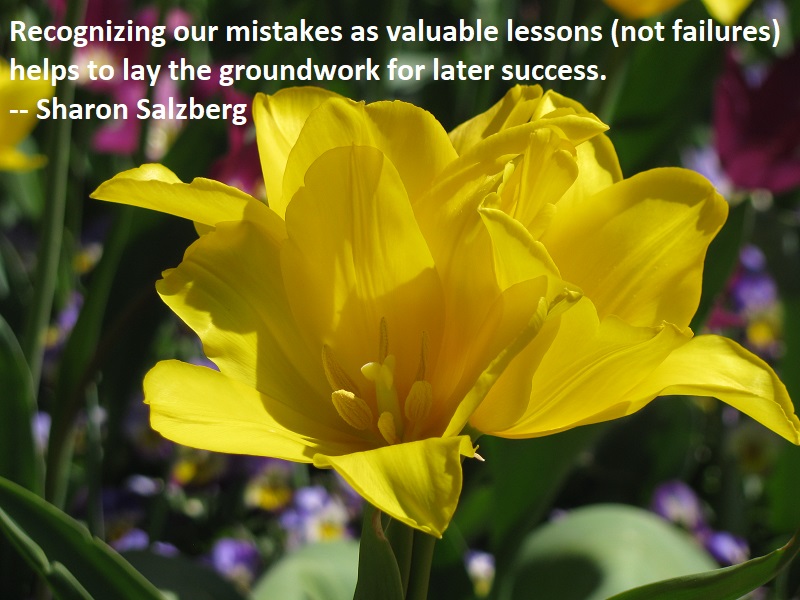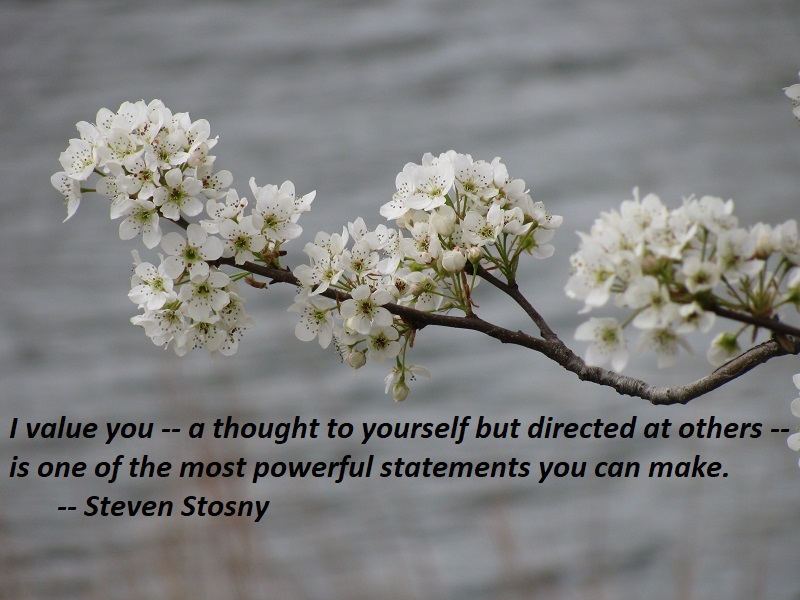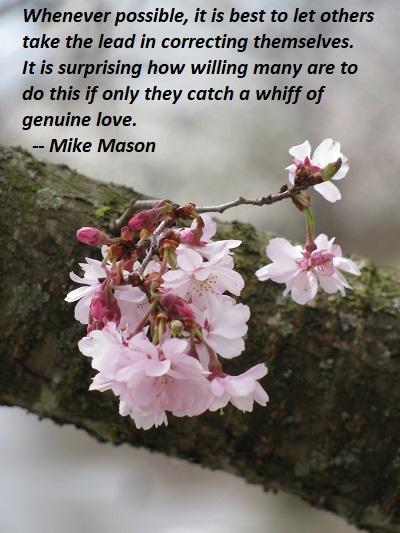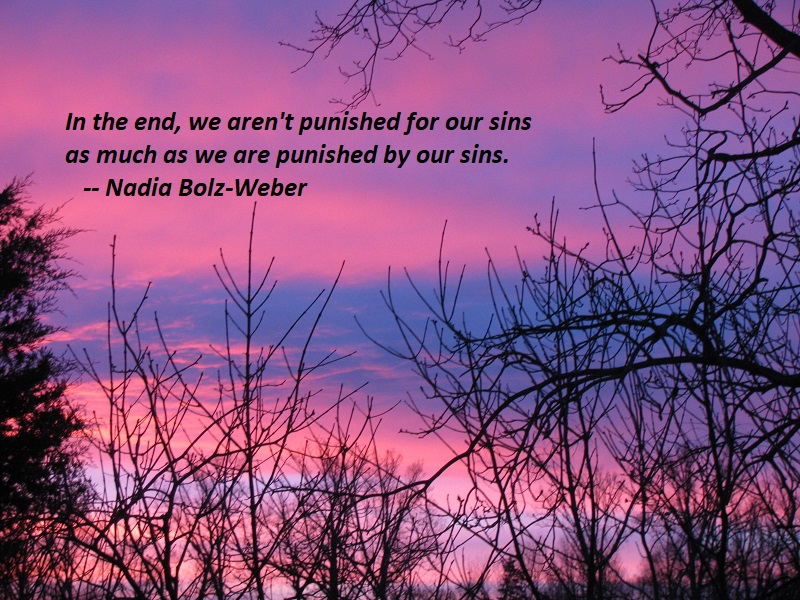Category: Growth
Spreading Good
I value you — a thought to yourself but directed at others — is one of the most powerful statements you can make. In the long run, your contribution to the Web of Emotion will improve family life and help build communities. You will soar above as you make the world a better place. Every area of your life will improve if you wake up each morning thinking, I will spread good in the world today.
— Steven Stosny, Soar Above, p. 2018
[Photo: South Riding, Virginia, April 6, 2018]
One True Purpose
The one true end of all speech concerning holy things is — the persuading of the individual man to cease to do evil, to set himself to do well, to look to the lord of his life to be on his side in the new struggle. Supposing the suggestions I have made correct, I do not care that my reader should understand them, except it be to turn against the evil in him, and begin to cast it out. If this be not the result, it is of no smallest consequence whether he agree with my interpretation or not. If he do thus repent, it is of equally little consequence; for, setting himself to do the truth, he is on the way to know all things. Real knowledge has begun to grow possible for him.
— George MacDonald, The Hope of the Gospel, p. 37-38
[Photo: Burg Rheinfels, Germany, April 4, 1997]
Positive Function of Pain
Emotional pain serves the same positive function as its physical counterpart. Feeling disregarded, guilty, devalued, or unlovable prompts you to raise self-regard, compensate for any bad behavior, increase your competence, and be more loving. If you do those things, or merely think about doing them, the pain subsides. If you don’t, it gets worse and worse until it goes numb. I’m not saying that you have to increase loving behavior toward the partner who betrayed you; that would be too risky in the early part of your recovery. To relieve the pain of feeling unlovable, try to be more loving toward your children or parents or friends, or anyone whom you can love with minimal risk.
If you want to exploit the motivational advantage of emotional pain, you cannot view painful memories as punishments inflicted by others or as self-punishments for past mistakes. They are not punishments to be avoided; they are motivations to heal, improve, repair, and grow.
— Steven Stosny, Living and Loving After Betrayal, p. 20-21
[Photo: Keukenhof, Holland, April 17, 2004]
Other People’s Needs
We think we know so well what other people need. Often enough we do. But before we can tell what we know, we must first, paradoxically, forget we ever knew it. We must enter the fire of a person’s living presence and accept the risk of spontaneous, unpremeditated relationship. Only in the midst of the free fall of real personal encounter may we discover, when we least expect it, the wisdom to confront a thorny problem.
Whenever possible, it is best to let others take the lead in correcting themselves. It is surprising how willing many are to do this if only they catch a whiff of genuine love. In this atmosphere, as often as not, the forbidden issue will actually be raised by the other person first, and suddenly we’re invited to give the counsel stored up within us. Alternatively, once we come to know and appreciate others, it may no longer seem so important to give them a piece of our mind!
— Mike Mason, Practicing the Presence of People, p. 155
[Photo: South Riding, Virginia, April 11, 2018]
Punished By Our Sins
This view of sin and punishment is perhaps not as commonly held now as it was in previous generations, so I’m not sure how many people believe that God is holding a big grudge against them for being bad. Sure, some still believe that in heaven there is a list of good behaviors and bad behaviors and therefore to know that God forgives your sin is to know that God has erased the red marks against you and therefore is no longer mad, which means he won’t punish you.
But honestly, I’m much more tortured by my secrets, which eat away at me, than I am concerned about God being mad at me. I’m more haunted by how what I’ve said and the things I’ve done have caused harm to myself and others than I am worried that God will punish me for being bad. Because in the end, we aren’t punished for our sins as much as we are punished by our sins.
— Nadia Bolz-Weber, Accidental Saints, p. 130
[Photo: Sunrise, South Riding, Virginia, March 16, 2015]
Real Self-Love
Real love allows for failure and suffering. All of us have made mistakes, and some of those mistakes were consequential, but you can find a way to relate to them with kindness. No matter what troubles have befallen you or what difficulties you have caused yourself or others, with love for yourself you can change, grow, make amends, and learn. Real love is not about letting yourself off the hook. Real love does not encourage you to ignore your problems or deny your mistakes and imperfections. You see them clearly and still opt to love.
— Sharon Salzberg, Real Love, p. 16
Increasing Accountability with Self-Forgiveness
Surprisingly, it’s forgiveness, not guilt, that increases accountability. Researchers have found that taking a self-compassionate point of view on a personal failure makes people more likely to take personal responsibility for the failure than when they take a self-critical point of view. They also are more willing to receive feedback and advice from others, and more likely to learn from the experience.
— Kelly McGonigal, The Willpower Instinct, p. 148.
Forming a Grievance
There are very few instances where the long-term use of anger will be of help to you. I want to make clear, once a situation has passed, both the long-term naming of angry feelings and the expression of anger rarely lead to good results. Anger can be a wonderful short-term solution to your life’s difficulties, yet it is rarely a good long-term solution to painful events. Anger is simply our way of reminding ourselves that we have a problem that needs attention. Yet too often we get angry instead of taking constructive action, or we get angry because we do not know what else to do.
It is my contention that the long-term experience of anger, or what we call a grievance, is almost never helpful.
— Dr. Fred Luskin, Forgive for Good, p. 14.
The Broken
Hannah tasted salty tears of infertility. Elijah howled for God to take his life. David asked his soul a thousand times why it was so downcast. God does great things through the greatly wounded. God sees the broken as the best and He sees the best in the broken and He calls the wounded to be the world changers.
— Ann Voskamp, The Broken Way, p. 24





